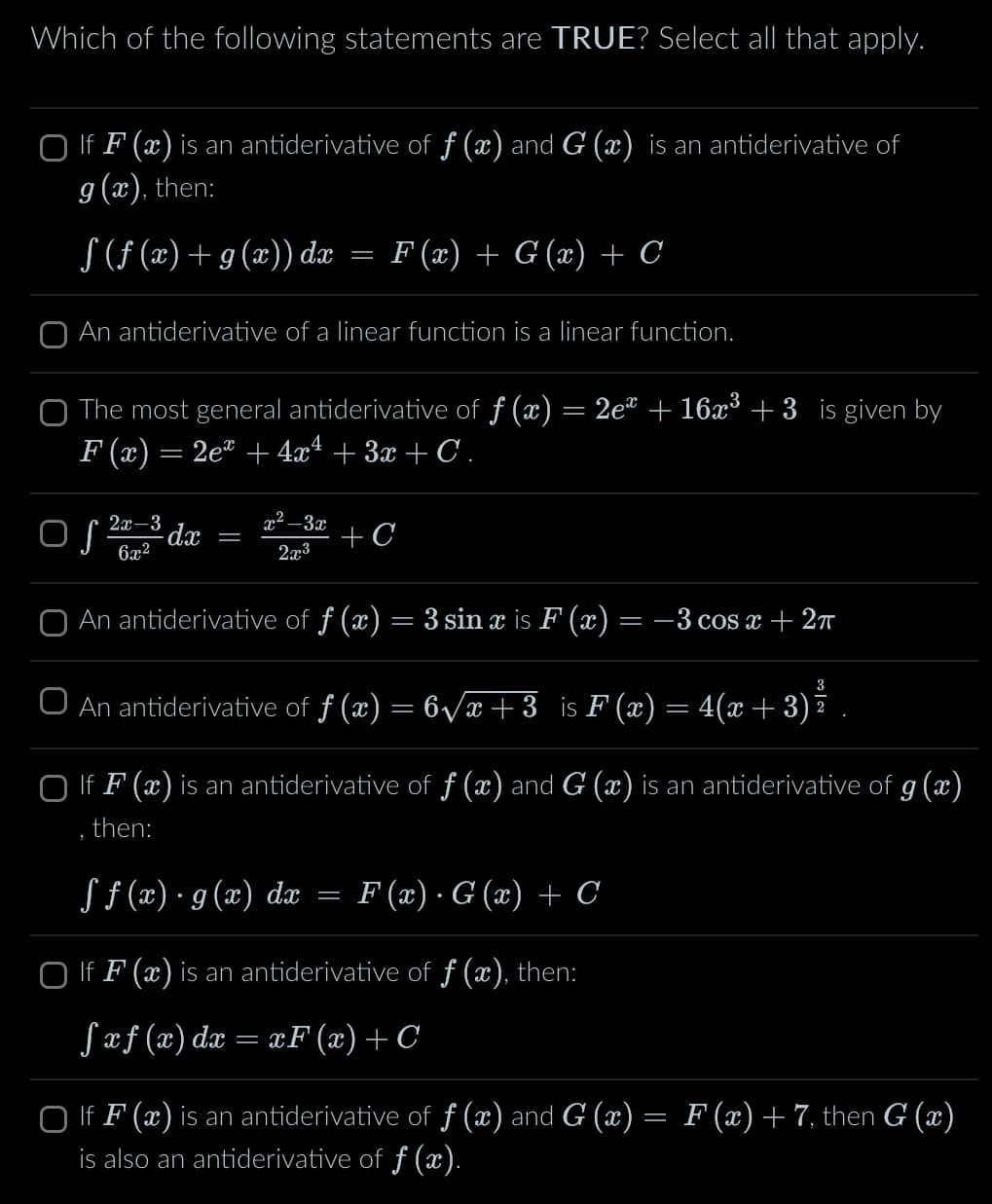Which of the following statements are TRUE? Select all that apply. If F(x) is an antiderivative of f (x) and G (x) is an antiderivative of g(x), then: f(f(x)+g(x)) dx = F(x) + G (x) + C An antiderivative of a linear function is a linear function. The most general antiderivative of f (x) = 2ex + 16x3 +3 is given by F(x) = 2ex + 4x4 + 3x + C. 6x2 Of 2-3 dx = 2. -3x 2x3 + C An antiderivative of f (x) = 3 sin x is F (x) = −3 cos x + 2π ☐ An antiderivative of ƒ (x) = 6√√x+3 is F(x) = 4(x+3) 3 2 If F(x) is an antiderivative of f (x) and G (x) is an antiderivative of g (x) " then: ƒ ƒ (x) · g(x) dx = F(x) · G(x) + C If F(x) is an antiderivative of f (x), then: fxf(x) dx=xF(x) +C If F (x) is an antiderivative of f (x) and G (x) = F(x) +7, then G (x) is also an antiderivative of f (x).
Which of the following statements are TRUE? Select all that apply. If F(x) is an antiderivative of f (x) and G (x) is an antiderivative of g(x), then: f(f(x)+g(x)) dx = F(x) + G (x) + C An antiderivative of a linear function is a linear function. The most general antiderivative of f (x) = 2ex + 16x3 +3 is given by F(x) = 2ex + 4x4 + 3x + C. 6x2 Of 2-3 dx = 2. -3x 2x3 + C An antiderivative of f (x) = 3 sin x is F (x) = −3 cos x + 2π ☐ An antiderivative of ƒ (x) = 6√√x+3 is F(x) = 4(x+3) 3 2 If F(x) is an antiderivative of f (x) and G (x) is an antiderivative of g (x) " then: ƒ ƒ (x) · g(x) dx = F(x) · G(x) + C If F(x) is an antiderivative of f (x), then: fxf(x) dx=xF(x) +C If F (x) is an antiderivative of f (x) and G (x) = F(x) +7, then G (x) is also an antiderivative of f (x).
Functions and Change: A Modeling Approach to College Algebra (MindTap Course List)
6th Edition
ISBN:9781337111348
Author:Bruce Crauder, Benny Evans, Alan Noell
Publisher:Bruce Crauder, Benny Evans, Alan Noell
Chapter1: Functions
Section1.2: Functions Given By Tables
Problem 32SBE: Does a Limiting Value Occur? A rocket ship is flying away from Earth at a constant velocity, and it...
Related questions
Question

Transcribed Image Text:Which of the following statements are TRUE? Select all that apply.
If F(x) is an antiderivative of f (x) and G (x) is an antiderivative of
g(x), then:
§ (ƒ (x) + g(x)) dx
=
F(x) + G(x) + C
An antiderivative of a linear function is a linear function.
The most general antiderivative of ƒ (x) = 2e² + 16x³ +3 is given by
F(x) = 2ex +4x² +3x+C .
○ √ 22-3³ dx = x²-3 +C
Of 6x2
2x3
An antiderivative of ƒ (x) = 3 sin x is F (x) = −3 cos x + 2π
3
An antiderivative of ƒ (x) = 6√√x+3 is F(x) = 4(x+3)ź
☐ If F(x) is an antiderivative of ƒ (x) and G (x) is an antiderivative of g(x)
then:
ƒ ƒ (x) · g(x) dx
=
F(x) · G (x) + C
☐ If F(x) is an antiderivative of f (x), then:
fxf(x) dx = xF(x) +C
If F(x) is an antiderivative of f (x) and G (x) = F(x) + 7, then G (x)
is also an antiderivative of ƒ (x).
Expert Solution
This question has been solved!
Explore an expertly crafted, step-by-step solution for a thorough understanding of key concepts.
This is a popular solution!
Trending now
This is a popular solution!
Step by step
Solved in 8 steps with 22 images

Recommended textbooks for you

Functions and Change: A Modeling Approach to Coll…
Algebra
ISBN:
9781337111348
Author:
Bruce Crauder, Benny Evans, Alan Noell
Publisher:
Cengage Learning

Algebra & Trigonometry with Analytic Geometry
Algebra
ISBN:
9781133382119
Author:
Swokowski
Publisher:
Cengage

Glencoe Algebra 1, Student Edition, 9780079039897…
Algebra
ISBN:
9780079039897
Author:
Carter
Publisher:
McGraw Hill

Functions and Change: A Modeling Approach to Coll…
Algebra
ISBN:
9781337111348
Author:
Bruce Crauder, Benny Evans, Alan Noell
Publisher:
Cengage Learning

Algebra & Trigonometry with Analytic Geometry
Algebra
ISBN:
9781133382119
Author:
Swokowski
Publisher:
Cengage

Glencoe Algebra 1, Student Edition, 9780079039897…
Algebra
ISBN:
9780079039897
Author:
Carter
Publisher:
McGraw Hill

Algebra and Trigonometry (MindTap Course List)
Algebra
ISBN:
9781305071742
Author:
James Stewart, Lothar Redlin, Saleem Watson
Publisher:
Cengage Learning

Algebra: Structure And Method, Book 1
Algebra
ISBN:
9780395977224
Author:
Richard G. Brown, Mary P. Dolciani, Robert H. Sorgenfrey, William L. Cole
Publisher:
McDougal Littell